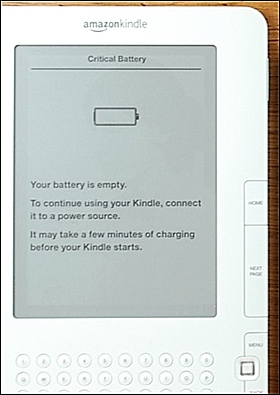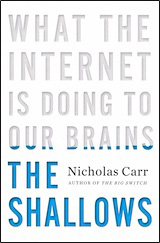- E-Books to Join The New York Times Best-Seller List [NYTimes.com]: NYT spent two years coming up with system for separate e-bestseller list. "The lists will be compiled from weekly data from publishers, chain bookstores, independent booksellers and online retailers, among other sources."
- Why The Book Business May Soon Be The Most Digital Of All Media Industries [James McQuivey, paidContent]: Forrester forecast: "2010 will end with $966 million in e-books sold to consumers. By 2015, the industry will have nearly tripled to almost $3 billion, a point at which the industry will be forever altered." More from McQuivey at Forrester.
- Kindle 3: e-book readers come of age [Nate Anderson, Ars Technica]: "Now that standalone e-book readers like the Kindle have hit mass market prices (the new WiFi-only Kindle is a mere $139) and have turned into high-quality reading machines at last, the question is what's lost and what's found in the move to e-books? Or, to put it another way, does it really matter that I can no longer smell my books?"
- Color E Ink to Be Sold in Hanvon E-Reader [NYTimes.com]: "E Ink screens have two advantages over LCD — they use far less battery power and they are readable in the glare of direct sunlight. However, the new color E Ink display, while an important technological breakthrough, is not as sharp and colorful as LCD. Unlike an LCD screen, the colors are muted, as if one were looking at a faded color photograph. In addition, E Ink cannot handle full-motion video. At best, it can show simple animations."
- Linux e-readers are evolving into Android-tablets [Steven Vaughan-Nichols, Computerworld Blogs]: "I knew that dedicated e-readers would die off. What I didn't see happening was that the e-reader vendors would also see that happening and start transforming their Android Linux-powered e-reader devices into tablets."
- Will Your Local Library Lend E-Books? (Or Can They?) [Audrey Watters, Read Write Web]: "According to some publishers, if libraries start lending e-books, it could serve to 'undo the entire market for e-book sales.' "
- ISBNs and E-books: The Ongoing Dilemma [Erik Christopher, Publishing Perspectives]: "As more people venture into the e-book world, they inevitably come across a question they need to answer: Should I assign an ISBN to my e-book?"



